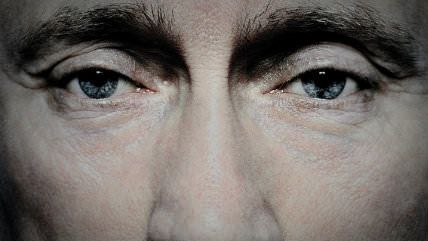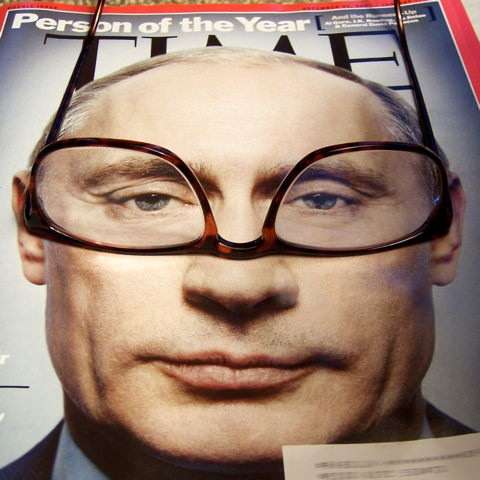Putinism's Final Crisis?
There are many signs that Putin's billionaire pals are already chafing at the costs of his adventurism.


Last February, after Ukraine's pro-Russian president Victor Yanukovych fled the country and ceded power to a pro-Western coalition, my column on the Kiev revolution dubbed Vladimir Putin the biggest loser of that week: his efforts to turn Ukraine into a vassal state had succeeded only in turning it into an unfriendly neighbor. In March, when Russia completed its triumph in Crimea with a formal annexation, I received my share of comments pointing out, ruefully or gleefully, that the "loser" had bitten off a large chunk of Ukraine and was poised to grab more. Yet less than six month later, the Kremlin autocrat looks more and more like the proverbial emperor with no clothes—an apt metaphor given both Putin's taste for imperialism and his taste for topless posing.
The past week has been nothing but a string of bad news for Putin. In the wake of the downing of Malaysian Airlines Flight 17, almost certainly by Russia-backed and Russian-led insurgents in Eastern Ukraine, the United States and the European Union have mustered the will to impose sanctions that have some real bite.
Meanwhile, the slow-grinding wheels of justice are catching up with Putin over old crimes and misdemeanors. In a landmark decision Monday, the Permanent Court of Arbitration in the Hague, Netherlands ordered Russia to pay $50 billion to former shareholders of Yukos, the oil giant dismembered and sold off by the Russian government after its owner, Mikhail Khodorkovsky, ran afoul of Putin by refusing to stay out of politics. On Thursday, the European Court of Human Rights in Strasbourg, France hit Russia with an additional 1.9 billion euros—over $2.5 billion—in compensation to Yukos shareholders. (If Russia does not start paying up, its assets abroad can be targeted.) Adding a minor but stinging insult to injury, the Strasbourg court also awarded almost $40,000 in damages and legal expenses to Russian opposition leader Boris Nemtsov over an improper arrest at a 2010 rally. The money is a drop in the bucket, but the symbolism matters.
Also on Thursday, Putin's very own version of Banquo's ghost came back to haunt him from England, where a judge opened a high-level official inquiry into the 2006 radioactive poisoning death of ex-KGB agent Alexander Litvinenko. (The suspects are Russian agents, one of them now a member of Putin's toy parliament.) British authorities claim the timing has nothing to do with current events; yet, only a year ago Home Secretary Theresa May admitted that the inquiry was stalled partly due to concerns about "international relations." International relations aren't what they used to be.
There is widespread agreement that Putin stumbled badly with his plans for "Novorossiya"—the archaic, Tsarist-era term for Eastern Ukraine that he and his propagandists have dusted off. After the quick success in Crimea, met with toothless and fairly muted outrage from the West, Putin apparently hoped to use the same modus operandi in the Donetsk and Luhansk regions: having a motley crew of disaffected locals and Russian "volunteers" seize power by taking over city and regional government buildings, hold referendums, and declare independence. His goal may not have been annexation—a bit too much even for the accommodating international community to swallow—but gaining enough leverage to keep Ukraine cowed, demoralized, and unfit for European Union partnership.
As Putin learned the hard way, "Novorossiya" is no Crimea. A large percentage of Crimea's population did support unification with Russia (even if the official referendum results were bogus, as confirmed by data disclosed by a government-affiliated Russian human rights group). In Eastern Ukraine, on the other hand, widespread distrust of the new pro-Western government in Kiev did not translate into separatist sentiment: in a Pew poll in April, secession was viewed as a permissible option by only 18 percent of the region's population and 27 percent of its Russian speakers. The "referendums" in the Donetsk and Luhansk regions lacked even the patina of legitimacy that the Crimea vote had, and even Russia didn't quite have the nerve to recognize it.
The fact that the leadership of the two pseudo-republics was dominated by Russian citizens—often with ties to Russia's "special services" and with vaguely comical backgrounds of political spin doctor or battle-reenactment hobbyist—didn't help boost their credibility. Neither did their record of kidnappings and other thuggish actions. Meanwhile, the Ukrainian army was able to overcome its initial problems with organization and morale, mounting an impressive and largely successful offense against the rebels.
The shoot-down of Flight MH17, which killed 298 people on board, was both a tragic twist of fate and a natural outcome of Russia's reckless actions: creating a war zone on European soil and supplying powerful, army-grade weapons to a ragtag militia with a lot of crazy extremists, thugs, and thrill-seekers among them was bound to have unintended consequences, none of them good.
Now, commentators both in the West and in the independent Russian press note that Putin may be caught in an actual no-win situation. On the Russian website EJ.ru, political analyst Dmitry Oreshkin writes:
Who'd want to be in the boss's shoes? Instead of a thunderous Novorossiya blitzkrieg greeted by the jubilation of women, he got the quagmire of a long, bloody fratricidal war—one, moreover, that looks more and more obviously lost. Add to that the albatross of three hundred foreign dead bodies around his neck.
Right now, Putin has several choices:
(1) Ditch the insurgents, seek compromise, and risk losing face in front of the Russian public whose nationalist fervor he has whipped up: from world-defying Protector of Russians Everywhere to craven sellout on bended knee before the West. (What's more, the betrayed insurgents could come back to foment nationalist unrest within Russia.)
(2) Openly invade Eastern Ukraine on a "peacekeeping" mission—a scenario rife with obvious potential for disaster.
(3) Continue unofficially aiding the "Donetsk Republic" with manpower, firepower, and other support, creating a long-term "frozen conflict" in Eastern Ukraine. While this would not be as disastrous as open war, it would still risk even stronger international backlash, including more sanctions that could severely hurt not only Russia's economy but the personal fortunes of Putin and his crony capitalists. It could also become a non-option if the Ukrainian army manages to rout the insurgency.
So far, Putin has continued—perhaps in an attempt to stall for time—to vacillate between the "war party" and the "peace party," between saber-rattling and apparent moves to curb the nationalist madness. In recent days, Russian military units have been acting more aggressively at Ukraine's border. Yet there are also signs that the Novorossiya Plan is on its last legs.
One of its most ardent proponents, "Eurasianist" Kremlin guru Alexander Dugin, seems to have fallen out of favor; he has been dismissed as chair of the Moscow State University department of sociology, and possibly sacked altogether. A few days ago, Kommersant columnist Andrei Kolesnikov—who, according to Radio Free Europe/Radio Liberty writer Brian Whitmore, "regularly travels with Putin and is often a conduit for messages from the regime's inner sanctum to the broader elite"—wrote that Putin will cut the insurgents loose if it turns out they are definitely responsible for downing the Malaysian airplane. And on Saturday, a Moscow rally in support of Russian intervention to save "Russian Donetsk" was attended by only about 1,500 people from far-right nationalist groups, with no people bused in by official organizations (by comparison, a March 2 Moscow rally in support of Crimean separatists was about 20,000 strong).
There is a view, voiced recently in the Time cover story by Simon Shuster, that Putin has an almost supernatural ability to come out on top, growing stronger from each crisis like a mythological monster. But Shuster's analysis was based on the already-dated premise that the West would not muster the collective will to impose tough sanctions—and on the assumption that feeling the pain from Western punishment would cause Russians to rally even more loyally around their leader.
In the short term, that may be true. But I wouldn't bet on this loyalty to stand the test of real hardship. Putin's unspoken agreement with his constituency has always been a trade of civil rights and political freedoms for economic security. And that means not just the drab Soviet-era minimal-welfare state with its cramped apartments, food lines, and perennial shortages of goods, but a relatively affluent consumer society. Passionate patriots like newspaper columnist Ulyana Skoibeda may declare their readiness to "wear peasant boots" and forego "thirty different kinds of sausage in the refrigerator" for the sake of national pride and Slavic brotherhood, but it is far from certain that such sacrifice with prove popular in practice—perhaps even with those who preach it.
Meanwhile, there are many signs that Putin's billionaire pals are already chafing at the costs of his adventurism. Even before the latest sanctions, there were reports, based on German intelligence sources, of a power struggle in the Kremlin between hardliners and business leaders. Early in July, a similar report of a split between "hawks" and "doves" within Russia's power elites appeared in the Russian online newspaper Znak.com, which Russian online media analyst and Moscow Times columnist Victor Davidoff told me has connections to Kremlin insiders. Today's Russian elite, unlike the Soviet-era nomenklatura with its home-based dachas and luxury foods, has a lot to lose in the West. The latest reminder of this fact comes from reports on the U.S. properties of Mikhail Lesin, former press minister and currently head of a giant state-controlled media holding, who may soon become the target of a federal money laundering investigation. Lesin and his immediate family members own multiple residences in the Los Angeles area said to be worth at least $28 million.
The ongoing crisis may signal other troubles for Putin as well. The flirtation with separatism in Eastern Ukraine is already rousing long-simmering separatism in some Russian regions, including Siberia. The armed Russian ultranationalists and neo-fascists the Kremlin is enabling across the border may bring their fight home if they are kicked out of Ukraine, especially if they blame their defeat on Putin's inaction. Crimea has already become a money pit—the government has raided future retirees' pension funds to finance the peninsula's development—and a source of ethnic conflict.
With his stunning 86 percent approval rating, Putin may seem to be riding high. But this patriotic and imperialist fever may prove to be the start of Putinism's final crisis.
This article originally appeared at Real Clear Politics.


Show Comments (49)